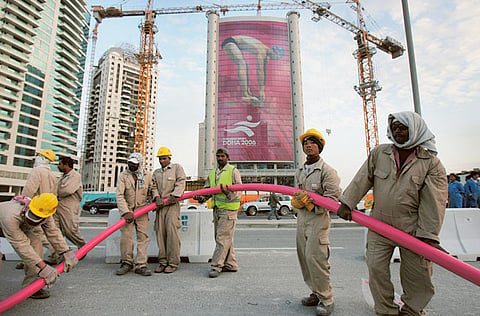Rights groups urge protection for migrant workers
Outrage erupts over deaths of 44 Nepali workers on projects linked to 2022 World Cup

Kathmandu: Rights groups urged South Asian governments on Friday to demand proper protection for their migrant workers amid outrage over the deaths of dozens of Nepalis on projects linked to the 2022 World Cup in Qatar.
While Nepal’s government said it would not try to halt the flow of migrant workers after a newspaper investigation into their conditions, activists said the blame should not only rest with employers in the Gulf.
Millions of people from impoverished parts of the sub-continent work in Gulf states, such as Qatar and Saudi Arabia, sending home remittances that are crucial to their families’ welfare and to their nation’s finances. Qatar alone is home to about 300,000 Nepali workers, according to government figures, most of whom are drawn from impoverished rural areas.
The vast majority are working on construction projects and are hired by Nepal-based employment agencies that operate under licence from the government and are meant to adhere to regulations on working conditions.
Buddhi Bahadur Khadka, a spokesman for the labour ministry in Kathmandu, said Nepalese officials based in the embassy in Doha did vet employers to ensure they follow “standard guidelines” but admitted there were problems.
“Despite our efforts, there have been irregularities. That needs to be changed and we are trying our best,” he said.
An investigation published by Britain’s Guardian newspaper this week found that 44 Nepali migrants had died during the summer in Qatar when temperatures can reach around 50 degrees Celsius (122 degrees Fahrenheit). It detailed how some had not been paid for months, were denied drinking water and had their passports confiscated as they toiled on a range of infrastructure projects being readied for when Qatar hosts football fans from around the world in less than a decade.
Suhas Chakma, director of the Asian Centre for Human Rights, said governments on the sub-continent had too often turned a blind eye to the “horrendous” conditions that he said frequently breached international agreements.
“It is unfortunate that the governments of the sending countries are taking no action vis-a-vis compliance with the UN convention on migrant labourers,” Chakma said.
“This issue does not concern only Nepal. There are thousands of labourers from India, Pakistan, Sri Lanka and Bangladesh who are travelling abroad for work. It is time the SAARC (South Asian Association for Regional Cooperation) countries frame a policy for protection of their labourers from abuse and exploitation,” he added in reference to the eight-nation regional bloc headquartered in Kathmandu.
“Nepalese workers have been dying due to abusive labour conditions for years but it is only being talked about now because of the World Cup,” he added.
Meenakshi Ganguly, South Asia director at Human Rights Watch, agreed it should not be just left up to the host country to treat workers properly. “South Asian countries, which are a large group of senders, should work together to set minimum standards,” Ganguly said.
“Since remittances are a big part of the South Asian economy, the SAARC countries should join together to demand better worker protections.” Khadka said that Qatari government officials had pledged that migrants would be protected when they held talks with officials from Nepal’s labour ministry and foreign ministry in June.
“They assured us that their government will take action against the companies that violate the labourers’ rights but the workers had to lodge complaints detailing the exploitation and the violation of labour rights. So, it’s up to the Qatar government to safeguard our workers and we have our embassy to monitor it,” he added.
Nepal received 430 billion rupees ($434 million, Dh1.593billion) sent back by its roughly one million migrant workers in 2012, according to Nepal’s central bank, accounting for 22 percent of GDP in a country where around one in three young people are out of work.
“We won’t stop sending the workers just because their exploitation has been highlighted now. We can’t stop it because that’s the only major employment opportunity for the majority of Nepali youths,” Khadka said.



